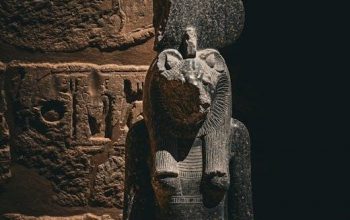The Heaven & Earth Grocery Store PDF⁚ A Comprehensive Overview
This comprehensive overview delves into James McBride’s acclaimed novel, “The Heaven & Earth Grocery Store,” exploring its captivating narrative, intricate characters, and profound themes․ The PDF offers a detailed examination of the novel’s setting, plot, and critical reception, providing readers with a complete understanding of this literary masterpiece․ Discover the interwoven lives of Chicken Hill’s residents and the secrets they hold within the walls of the titular grocery store․
The Novel’s Setting and Characters
James McBride’s “The Heaven & Earth Grocery Store” unfolds in the 1970s within the vibrant yet impoverished community of Chicken Hill, a fictional neighborhood situated in Pottstown, Pennsylvania․ This setting is a melting pot of diverse ethnicities and socioeconomic backgrounds, housing Black, Jewish, and white immigrant families who share a common thread of economic hardship․ The novel’s narrative is anchored by the Ludlow family, owners of the eponymous grocery store, which serves as the heart of Chicken Hill․ Moshe and Chona Ludlow, along with their extended family and community members, form a cast of richly developed characters, each grappling with their own unique struggles and secrets․ The detailed descriptions of Chicken Hill create a vivid and immersive atmosphere, reflecting the complexities of human interaction within a close-knit community․ The characters are not merely archetypes, but deeply flawed individuals who represent the diversity and resilience of the human spirit in a time of social and economic upheaval․
Chicken Hill⁚ A Microcosm of Community
Chicken Hill, the fictional setting of James McBride’s novel, functions as a microcosm of the broader American experience, particularly reflecting the social and racial dynamics of 1970s Pennsylvania․ This ramshackle neighborhood, characterized by its dirt roads and modest homes, houses a diverse population of Black, Jewish, and white residents, all bound together by their shared economic circumstances and proximity․ The community’s interconnectedness is vividly portrayed through the interactions and relationships between its inhabitants, revealing both the joys and challenges of communal living․ Chicken Hill becomes a stage for exploring themes of racial harmony and tension, economic disparity, and the complexities of human relationships within a specific historical context․ The close proximity and shared experiences of the residents foster a sense of community, yet also highlight the underlying social divisions and prejudices that permeate their lives․ The neighborhood’s physical environment itself mirrors the social landscape, reflecting both the resilience and fragility of human connections․
The Ludlow Family and Their Grocery Store
Central to the narrative of “The Heaven & Earth Grocery Store” is the Ludlow family and their eponymous establishment․ Moshe and Chona Ludlow, the owners, represent a blend of cultures and backgrounds, reflecting the diverse community they serve․ Their grocery store isn’t merely a place of commerce; it serves as the heart of Chicken Hill, a vibrant hub of social interaction and community life․ The store’s shelves become a stage for the unfolding drama of the novel, witnessing the joys, sorrows, and secrets of its patrons․ Chona, in particular, plays a pivotal role, acting as a confidante and observer of the community’s daily life, her interactions within the store revealing the intricate web of relationships connecting the residents of Chicken Hill․ The Ludlow’s own story, interwoven with the lives of their neighbors, adds another layer of complexity to the narrative, highlighting themes of family, community, and the enduring power of human connection․ The store’s significance transcends its commercial purpose; it becomes a symbol of the community itself, a place where lives intersect and stories unfold․
Key Characters and Their Interwoven Lives
James McBride masterfully crafts a tapestry of interconnected lives within “The Heaven & Earth Grocery Store․” Nate Timblin, a Black man with a mysterious past, embodies quiet strength and resilience․ His relationship with Chona Ludlow highlights the unexpected bonds forged across racial and cultural divides․ Doc Roberts, the town’s physician, harbors a secret that adds to the novel’s suspense․ The diverse cast of characters, including Jewish, Black, and immigrant white residents, reflects the multifaceted nature of Chicken Hill itself․ Their intertwined stories showcase the complexities of human relationships, exploring themes of prejudice, understanding, and forgiveness․ Each character’s narrative adds depth and richness to the overall narrative, creating a complex and compelling portrayal of community life․ The characters are not simply individuals; they represent the fabric of a community grappling with its past and striving for a more harmonious future․ The relationships between these characters are the driving force behind the novel’s suspense and emotional resonance․
Themes Explored in the Novel
McBride’s novel explores profound themes of community, secrets, and redemption against the backdrop of 1970s Pennsylvania․ The interwoven lives of diverse characters reveal the complexities of racial and social dynamics within a small town․ Love and acceptance emerge as powerful forces amidst conflict and prejudice․
Love and Community in a Diverse Setting
In James McBride’s “The Heaven & Earth Grocery Store,” love and community blossom amidst a diverse tapestry of characters residing in the fictional Chicken Hill neighborhood of Pottstown, Pennsylvania․ The novel masterfully portrays the interwoven relationships among Black, Jewish, and white residents, highlighting their shared experiences and struggles within a setting marked by both harmony and conflict․ The Heaven & Earth Grocery Store itself serves as a powerful symbol of this interconnectedness, a central hub where neighbors gather, share stories, and forge bonds that transcend racial and cultural differences․ The narrative showcases how love and empathy can bridge divides, creating a sense of belonging despite societal pressures and personal secrets․ McBride’s skillful storytelling illuminates the resilience of the human spirit and the enduring power of community in the face of adversity․ The relationships depicted are not without their complexities, reflecting the realities of human interaction, but ultimately demonstrate the profound capacity for love and understanding to foster a sense of shared humanity․
Secrets and Redemption in 1970s Pennsylvania
James McBride’s “The Heaven & Earth Grocery Store” unfolds against the backdrop of 1970s Pennsylvania, a time of social and political change․ The novel artfully weaves a narrative centered around long-held secrets that ripple through the lives of Chicken Hill’s inhabitants․ These concealed truths, buried deep within the community’s history, begin to unravel with the discovery of a skeleton during construction work, triggering a chain of events that forces characters to confront their pasts․ The story explores themes of guilt, forgiveness, and the possibility of redemption․ Individual characters grapple with their own moral dilemmas and the weight of past actions, leading to moments of both reckoning and reconciliation․ McBride uses the setting of 1970s Pennsylvania not just as a backdrop, but as a crucial element in shaping the characters’ experiences and their journeys toward self-understanding and, potentially, redemption․ The social climate of the era adds another layer to the complexities of the secrets and the eventual quest for forgiveness․
Exploring Racial and Social Dynamics
In James McBride’s “The Heaven & Earth Grocery Store,” the diverse population of Chicken Hill—a blend of Black, Jewish, and white residents—provides a rich tapestry for exploring complex racial and social dynamics within a small Pennsylvania town․ The novel delves into the realities of interracial relationships and the subtle, yet pervasive, prejudices that existed during the 1970s․ McBride masterfully portrays the everyday interactions and unspoken tensions between these communities, highlighting both cooperation and conflict․ The characters’ experiences reveal the lingering effects of historical injustices and the ongoing struggle for equality and understanding․ The setting itself, a seemingly ordinary neighborhood, becomes a microcosm of broader societal issues, illustrating how racial and social dynamics play out in intimate and often unexpected ways․ The book doesn’t shy away from portraying the complexities of human relationships, showing how prejudice and misunderstanding can coexist alongside empathy and connection․
The Significance of the Grocery Store
The Heaven & Earth Grocery Store transcends its literal function, serving as a symbolic heart of the community in James McBride’s novel․ It’s a place of gathering, secrets, and unexpected connections, mirroring the novel’s broader themes․ The store’s role in uncovering long-held truths adds another layer of significance․
The Grocery Store as a Central Hub
In James McBride’s “The Heaven & Earth Grocery Store,” the eponymous establishment functions as far more than a simple place of commerce; it’s the vibrant, beating heart of the Chicken Hill community․ More than just a place to purchase groceries, it serves as a social hub, a meeting place where diverse residents—Blacks, Jews, and immigrant whites—intermingle and share their lives․ The store’s atmosphere is thick with the aroma of fresh produce and the murmur of conversations, a testament to the interconnectedness of the neighborhood’s inhabitants․ It’s within these walls that friendships are forged, secrets are whispered, and the daily rhythm of life unfolds, making it a microcosm of the community itself․ The Ludlow family’s presence adds a familial warmth, creating a space that feels both intimate and welcoming․ This central location becomes a crucial setting for the unfolding events and the development of the novel’s intricate plot, highlighting its importance to the overall narrative․ The grocery store isn’t merely a backdrop; it is an active participant in the story, shaping the interactions and relationships that define Chicken Hill․
Symbolism and Metaphor in the Setting
The setting of “The Heaven & Earth Grocery Store” transcends its literal representation, serving as a rich tapestry of symbolism and metaphor․ Chicken Hill, with its ramshackle houses and dirt roads, embodies a sense of both community and fragility, reflecting the lives of its diverse residents․ The grocery store itself, named “Heaven & Earth,” suggests a duality⁚ the mundane reality of daily life intertwined with the potential for something greater, a spiritual dimension hinted at throughout the narrative․ The well, where a skeleton is discovered, represents buried secrets and the hidden history of the town, a past that continues to shape the present․ The contrast between the old, decaying houses and the promise of a new housing development underscores themes of change and displacement․ McBride masterfully uses the setting not just as a backdrop but as an integral part of the narrative, enriching the story with layers of meaning that invite deeper reflection․ The physical setting thus becomes a powerful reflection of the emotional and spiritual landscape of the characters’ lives․
The Store’s Role in Uncovering Secrets
In James McBride’s “The Heaven & Earth Grocery Store,” the eponymous establishment acts as more than just a place of commerce; it functions as a central hub where secrets simmer and eventually boil over․ The novel’s plot unfolds organically within the store’s confines, with conversations overheard and observations made revealing hidden truths about the characters and their pasts․ The close-knit community, regularly gathering within the store’s walls, creates an environment where unspoken tensions and long-held mysteries are subtly exposed․ Chona Ludlow, the store’s manager, acts as a silent observer, privy to the community’s secrets, her observant nature contributing to the unraveling of the central mystery․ The discovery of the skeleton during the construction of a new development initially connects to the store through its proximity, but the store itself, with its daily interactions and accumulated knowledge, acts as the catalyst for revealing the truth behind the decades-old secret․
Critical Reception and Reviews
James McBride’s “The Heaven & Earth Grocery Store” has garnered significant praise, earning accolades and sparking engaging book club discussions․ Reader responses highlight its compelling narrative and exploration of complex themes․ Comparisons to McBride’s other works reveal a consistent thematic exploration of community and human connection․
Awards and Accolades
While specific award details aren’t readily available in the provided text excerpts regarding “The Heaven & Earth Grocery Store” PDF, the numerous mentions of the book’s status as a bestseller and its selection as a “Book of the Year” by several prominent publications strongly suggest a significant level of critical acclaim․ The frequent comparisons to McBride’s other award-winning works, such as “Deacon King Kong” and “The Good Lord Bird,” further imply that “The Heaven & Earth Grocery Store” has received considerable recognition within the literary community․ The enthusiastic reader reviews and book club discussions referenced also point towards widespread appreciation for the novel’s quality and impact․ The lack of explicitly stated awards in the provided text might simply reflect the limitations of the data sources, rather than a lack of recognition for this seemingly highly-regarded book․ Further research into dedicated literary award databases would likely reveal a more complete picture of its accolades․ The book’s success as a bestseller across major platforms like Amazon and Barnes & Noble speaks volumes about its popular reception․
Reader Responses and Book Club Discussions
The online excerpts highlight the significant engagement “The Heaven & Earth Grocery Store” has fostered among readers and book clubs․ References to “outstanding book club questions and leader guides” suggest readily available resources designed to facilitate enriching discussions․ These guides likely delve into the novel’s complex characters, intricate plot, and thought-provoking themes, stimulating lively conversations․ The mention of online resources linking to James McBride discussing his life further enhances the book club experience, allowing for a deeper understanding of the author’s inspirations and intentions․ Anecdotal evidence, such as the story of Annie gifting the book, showcases its personal impact on readers․ The numerous online forums and communities dedicated to discussing the novel, evidenced by questions about plot points and character motivations, reveal a passionate and engaged readership․ This widespread discussion underscores the book’s ability to connect with readers on an emotional and intellectual level, making it a compelling choice for book clubs seeking a stimulating and rewarding experience․
Comparisons to Other Works by James McBride
Online reviews frequently juxtapose “The Heaven & Earth Grocery Store” with McBride’s other acclaimed novels, particularly “Deacon King Kong” and “The Good Lord Bird․” These comparisons often highlight the recurring themes of community, faith, and the complexities of human relationships that permeate McBride’s work․ The descriptions emphasize the compassionate storytelling and inventive narrative styles present in all three novels, suggesting a consistent authorial voice despite diverse settings and characters․ The recurring exploration of racial and social dynamics, evident in all his works, is frequently cited as a key similarity․ While each novel possesses unique plotlines and characters, critics and readers note a shared thematic core exploring moral dilemmas, social injustices, and the enduring power of human connection․ The stylistic similarities, such as McBride’s masterful prose and ability to create vividly realized characters, are frequently mentioned, creating a sense of consistency across his oeuvre․ The comparisons reveal an evolution in style and thematic depth while maintaining a recognizable signature style․


